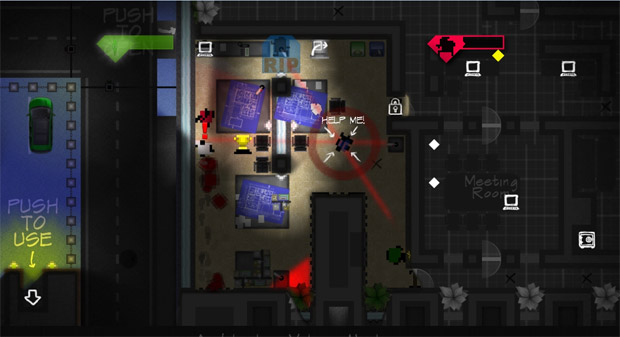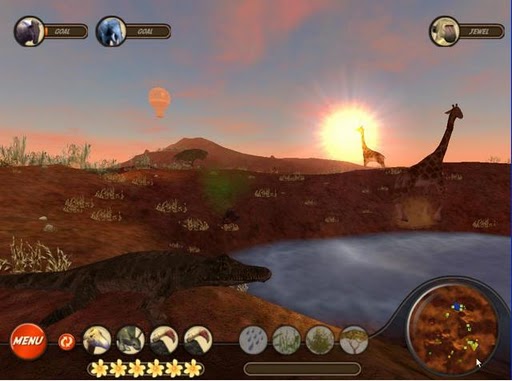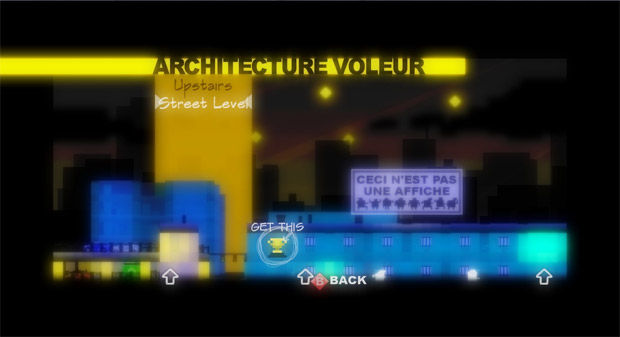This post has not been edited by the GamesBeat staff. Opinions by GamesBeat community writers do not necessarily reflect those of the staff.

The road to creating the award-winning, heist-themed indie game Monaco has been an eventful journey for Pocketwatch Games founder Andy Schatz. He came up with the idea for the 2010 Independent Games Festival grand-prize winner eight years ago, while he was doing contract work for Electronic Arts. At the time, no one was interested in picking up the game, so he put it on hold while burning himself out on development projects for other companies.
AAA Headaches
Schatz's credits include Whacked!, the first Xbox Live-enabled game, as well as online and AI programming work on Medal of Honor: Allied Assault – Breakthrough and GoldenEye: Rogue Agent. He admitted his coding experiences on those games were awful.
“It just wasn't fun. I was pulling all nighters all the time,” Schatz said.
He decided to step away from AAA development after EA moved the studio he worked at, TKO Software, from Santa Cruz to Los Angeles.
“EA LA basically said the contract's going to be pulled if you don't come down to LA right now,” he recalled. “Everyone had to be 'all hands on deck' seven days a week. We were there for four months on a game we knew was bad just to fight for our lives. There were guys who had to fight to be able to go home to see their families.”
Schatz was a lead programmer at that point, the first person in and the last one out. By the end of 2004, he was finished with that lifestyle. So he quit.
Going Indie
After quitting, Schatz decided to apply to business school. He sent applications to the entrepreneurial programs at Harvard, MIT, Stanford, and Berkeley. All four schools rejected him.
Around the time he received those rejections, Schatz read an article on Business Week Online focused on the rise of independent game development. Inspired, he decided to skip the business programs and go right into business.
He founded Pocketwatch Games at the end of 2004, recruiting some of his old coworkers from TKO to help with his first game, Wildlife Tycoon: Venture Africa, which has sold about 100,000 copies. He followed up that wildlife sim with another entitled Venture Arctic.

“I made the games that I wanted to make,” Schatz said of his first two games. “But when I first started as an indie, I was kind of looking at the space and trying to look at what was possible and what niches were unfufilled at the time. I've always thought that SimCity is the greatest pure game design of all-time. So I thought it would fun to work on basically SimCity with a lot more A.I.”
But Schatz credited something deeper than market trends for the creative vision of the Venture games: They were an opportunity to speak to gamers in the same way games — and by extension, their creators — spoke to him as a child.
“I am a strong believer in the idea that games can be really influential in people's lives,” he said. “Like with the Richard Garriott panel [at this year's Fantastic Arcade festival], I went up and talked to him because Ultima 4 is the reason I'm in games. I used to come home from second grade every day and rate myself on the eight virtues [of Ultima], on how well I was being as a human in terms of those eight virtues. 'Was I honest today? Was I courageous?' It was something I did on my own, but it was super influential in my life.”
Schatz figured that if he was going make games on his own, he would straddle the line between fun diversion and edutainment. Schatz pointed to the Discovery Channel as an example of this philosophy. People don't necessarily turn to Discovery to learn about sharks, but they may just happen to learn something from watching a show about them.
“While I don't have anything against God of War, God of War probably isn't being as influential in [people's] lives as games have the potential to be,” Schatz said.
His third planned title, Venture: Dinosauria, was to be the game he wanted the first two Venture games to be. It never came to fruition. After spending a year on it, he decided to scrap Dinosauria because he couldn't make it fun. The frustration of working on the failed game sent Schatz into a depression.
“In retrospect, I guess I don't look at it terms of what went wrong but what I could have done differently,” he said. “Trying to prototype a game in a complicated 3D engine is a really bad idea.”
He focused too much of his efforts on the graphics and not enough on the gameplay. By his estimation, he spent 80 percent of his time trying to get the art to work, setting up the build environment, and fighting the game engine. With the comparatively simple (and 2D) Monaco, he can spend 90 percent of his time building new features.
“I can build a new feature every hour,” he said. “It's that fast.”

Mapping Monaco
In an attempt to fight off the stress of Dinosauria, Schatz took breaks to work on other ideas. During one such break, Schatz revisited an old game-design pitch from his TKO days. That pitch would become Monaco.
He had concerns about going forward with the idea. Pocketwatch had built up an audience drawn to the company's ecosystem-centered simulations — a far cry from the heist-based multiplayer game he wanted to make. After mulling the idea for three days, he decided to go through with it. He thought the concept was fun and could potentially sell quite well.
After working on it for six weeks, Schatz submitted Monaco to the 2010 Independent Games Festival at the Game Developers Conference in San Francisco, where the game won both the Grand Prize and Excellence in Design awards.
Schatz has been hard at work on Monaco since then. He still doesn't know what platforms it will appear on, but having been built using Microsoft's XNA toolset, it already runs on both the PC and the Xbox 360.
Schatz often looks to the community for feedback. Recently, in fact, he announced an open call for voice talent for the game. For more information on the call and on Monaco in general, visit the game's Facebook and Twitter pages.
